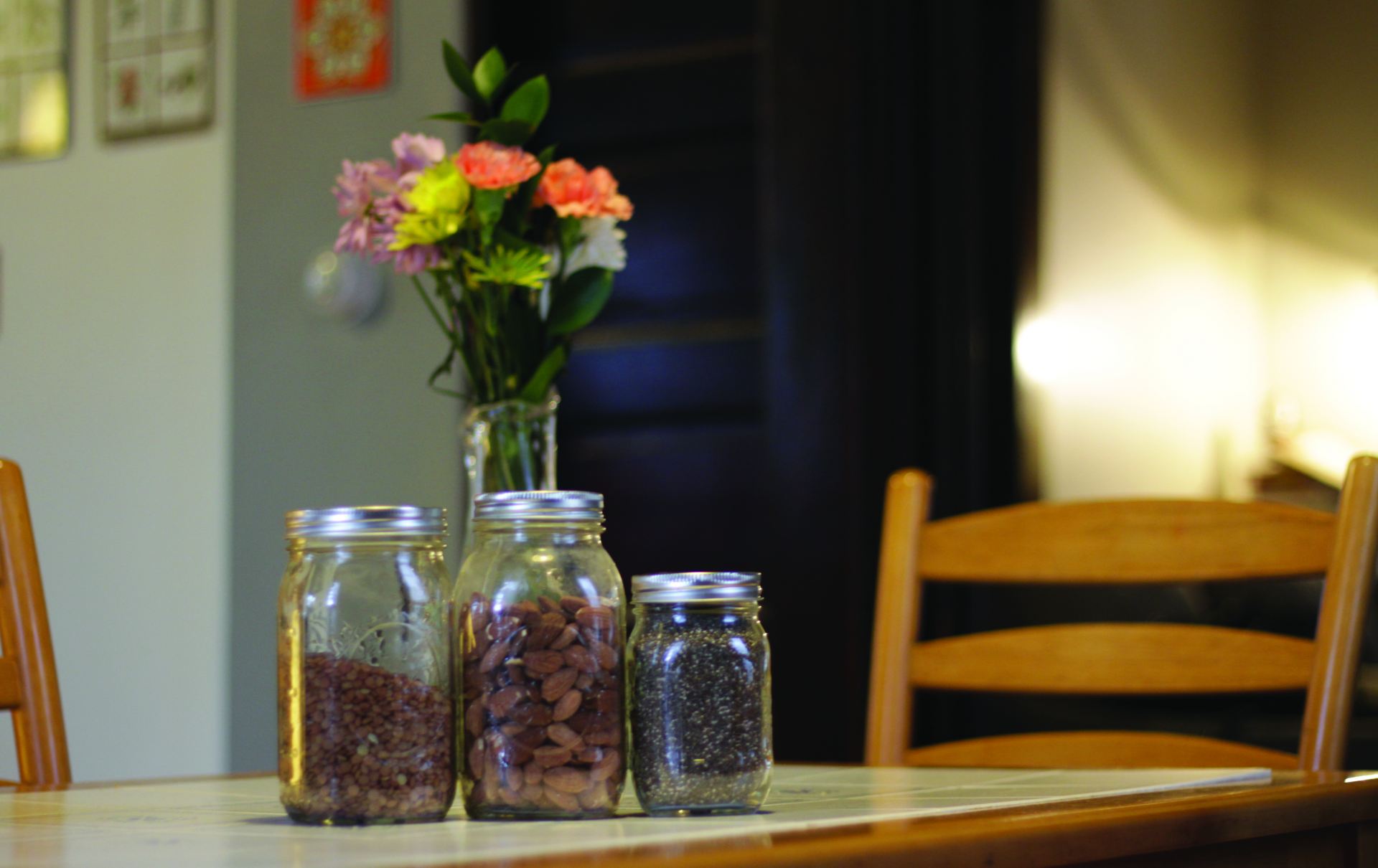
Ditch the plastic or cardboard packaging and invest in reusable jars to sustainably store your bulk food. Credit: Ris Twigg | Assistant Photo Editor
Living off campus means a number of things. You finally get your own bedroom, a private bathroom and (hopefully) get to choose your own housemates. But with great power comes great responsibility — and by that I mean it’s time to start paying bills.
Water. Electricity. Internet.
All these living costs that were previously included in the “room-and-board” portion of your tuition bill each semester will now come out of your pocket.
But what few know is that living a sustainable lifestyle can actually save you some money in the long run. Here are some of the most convenient ways for students living off campus to reduce their environmental impact and save some cash in the process.
Unplug appliances and electronic devices when not in use
Appliances such as microwaves, toasters, TVs and lamps, as well as phone and laptop chargers, draw what’s called “standby energy” to outlets — energy used when something is plugged in, even when they’re not connected to a device. Unplugging electronics and appliances when you won’t be using them for several hours can save you up to $100 per year, according to Energy Star’s website.
Turn off lights when you leave the room
Cut back even more on your electricity bill by turning off the lights each time you leave a room. If you have windows facing the sun in your home, shut off the lights and open the curtains — using natural light reduces the amount of electricity you use, is better on your eyes, and gives you some much-needed Vitamin-D. Also, switch your light bulbs to LED and Energy Star technology. According to Energy Star, each light bulb lasts 10-25 times longer than regular light bulbs and reduces energy usage by up to 90 percent.
Buy food in bulk
Most dry goods are packaged in plastic or cardboard. In the case of cardboard, that extra packaging can be recycled. But when it comes to plastic, Rumpke — the city of Columbus’ and Ohio State’s recycling contractor — can recycle only bottled-shaped plastics. Which means the plastic bag holding your coffee grounds can’t be recycled.
Instead, buy food in bulk. At most grocery stores like Lucky’s Market or Kroger you can actually bring in your own reusable jars to fill up with your favorite dry goods. Alternatively, Best Food Forward, an Ohio State student organization, offers a bulk-buying club where you can get produce and other foods in bulk for significantly less than you would at a grocery store. All of this saves you money because you’re only paying for the food, not the extra packaging.
Buy a reusable water bottle and coffee cup
We’ve all been there. At some point, you’ve gotten too lazy and left all the plastic water bottles you’ve drank in your room. They’ve infiltrated your bed, completely covered your desk and somehow they’ve even ended up in your laundry basket. Save yourself the hassle of cleaning up and invest in a reusable water bottle that you can refill and take with you on the go. A typical reusable water bottle costs between $10-20, whereas the cost of buying a 24-pack of water from Kroger each week for a year is approximately $156. Also, if you carry a reusable coffee mug with you, you not only can reduce the amount of single-use coffee cups you use (which can’t be recycled), but at all campus coffee shops, you can get any drink you want for the price of a small, no matter the size of your cup.
Conserve water
Taking shorter showers, washing full loads of dishes and turning off the faucet while you brush your teeth or shave can reduce your monthly water bill, putting more money in your pocket.
Before putting dishes into the dishwasher, skip the rinsing and put them straight in. Ask your landlord to install a low-flow showerhead that minimizes the amount of water coming out while maximizing water pressure. Always cover pots and pans with a lid to conserve water and heat. In addition, wash full loads of laundry with cold water. It cleans your clothes just as well, reduces energy usage by not heating the water and conserves water by washing one large load instead of two smaller ones.
Recycle
Columbus offers free recycling bins to everyone who doesn’t live in an apartment, and once you move off campus, the rules for recycling are the same as on-campus living. Bottle-shaped plastics, cardboard (including the non-greasy tops of pizza boxes), paper, unbroken glass, tin and aluminum all can be recycled. What about plastic bags? Unfortunately Rumpke doesn’t accept those, but you can either invest in a reusable bag or take your plastic bags back to the grocery store and they will recycle them for you.
Eat more vegetables for your main course
Meat is one of the more expensive food items we eat, racking up our weekly grocery bill. To ease the strain on your wallet, try going meatless once or twice a week. Experiment with recipes that use your favorite veggies, or spice it up and try something new like tofu, which costs about 50-75 cents per meal. Not only does going meatless prevent you from burning a hole in your pocket, but it also helps you meet the daily recommended servings of fruits and vegetables.


